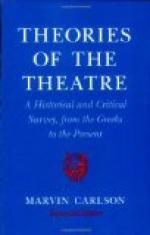At the present day, a very large proportion of the contributions to the theatre must be classed and judged as journalism. Such plays, for instance, as The Lion and the Mouse and The Man of the Hour are nothing more or less than dramatised newspapers. A piece of this sort, however effective it may be at the moment, must soon suffer the fate of all things timely and slip behind the times. Whenever an author selects a subject because he thinks the public wants him to talk about it, instead of because he knows he wants to talk about it to the public, his motive is journalistic rather than literary. A timely topic may, however, be used to embody a truly literary intention. In The Witching Hour, for example, journalism was lifted into literature by the sincerity of Mr. Thomas’s conviction that he had something real and significant to say. The play became important because there was a man behind it. Individual personality is perhaps the most dateless of all phenomena. The fact of any great individuality once accomplished and achieved becomes contemporary with the human race and sloughs off the usual limits of past and future.
Whatever Mr. J.M. Barrie writes is literature, because he dwells isolate amidst the world in a wise minority of one. The things that he says are of importance because nobody else could have said them. He has achieved individuality, and thereby passed out of hearing of the ticking of clocks into an ever-ever land where dates are not and consequently epitaphs can never be. What he utters is of interest to the public, because his motive for speaking is private and personal. Instead of telling people what they think that they are thinking, he tells them what they have always known but think they have forgotten. He performs, for this oblivious generation, the service of a great reminder. He lures us from the strident and factitious world of which we read daily in the first pages of the newspapers, back to the serene eternal world of little, nameless, unremembered acts of kindness and of love. He educates the many, not by any crass endeavor to formulate or even to mold the opinion of the public, but by setting simply before them thoughts which do often lie too deep for tears.
The distinguishing trait of Mr. Barrie’s genius is that he looks upon life with the simplicity of a child and sees it with the wisdom of a woman. He has a woman’s subtlety of insight, a child’s concreteness of imagination. He is endowed (to reverse a famous phrase of Matthew Arnold’s) with a sweet unreasonableness. He understands life not with his intellect but with his sensibilities. As a consequence, he is familiar with all the tremulous, delicate intimacies of human nature that every woman knows, but that most men glimpse only in moments of exalted sympathy with some wise woman whom they love. His insight has that absoluteness which is beyond the reach of intellect alone. He knows things for the unutterable woman’s reason,—“because....”




